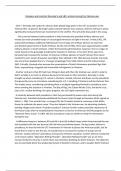Compare and contrast Kennedy's and LBJ's actions during the Vietnam war
John F. Kennedy and Lyndon B. Johnson both played huge parts in the US's association in the
Vietnam War. In general, Kennedy's policy toward Vietnam was cautious, whereas Johnson's policy
significantly increased American involvement in the conflict. This will all be discussed in this essay.
One contrast between both presidents is that Kennedy only provided military advisors and
money but never provided troops or encouraged Americans to fight in the war. In May 1961, JFK
authorized sending an additional 500 Special Forces troops and military advisors to assist the
pro‑Western government of South Vietnam. By the end of 1962, there were approximately 11,000
military advisors in South Vietnam. Under the Kennedy administration, however, the U.S. began to
invest heavily in the growingly troublesome situation in Vietnam. In his short three-year term,
Kennedy had increased the number of American military advisors in South Vietnam from seven
hundred to over sixteen thousand, way higher than allotted in the 1954 Geneva Accords. Kennedy
also more than doubled the U.S.’s foreign aid package from $223 million to $471 million (Cohen
349). Critically, Kennedy also oversaw the assassination of South Vietnamese president Ngo Dinh
Diem, representing a targeted and irreversible infringement in Vietnam.
Another contrast is that JFK had more things to deal with than the Vietnam war, which is why he
didn’t escalate it as much as Johnson because he focused on other priorities. Kennedy is rarely
brought up when considering U.S. action in Vietnam; Instead, Johnson and Nixon are the presidents
that generally come to mind when considering the U.S.’s handling of Vietnam and the Vietnam War.
This makes sense, considering everything there is to digest regarding Kennedy’s presidency, even
when omitting the situation in Vietnam. The Bay of Pigs, the Cuban Missile Crisis, the Berlin crisis,
Laos crisis, nuclear bombing, the space program, the civil rights movement etc.
A similarity between both presidents is that they promoted the peace corps also during the
Vietnam war. President Kennedy established the Peace Corps through an Executive Order signed on
March 1, 1961. Five months later, on August 28, the President hosted a ceremony at the White
House to celebrate the peace corps. They also helped in the Vietnam war, by educating students,
building villages and schools. President Lyndon B. Johnson further underscored the importance of
the Peace Corps when he established the Volunteers in Service to American (VISTA) program as the
“domestic Peace Corps” in 1964. LBJ also used peace corps as soldiers to help the Vietnamese
during the war.
A difference however, between JFK and LBJ is that LBJ drafted troops which Americanized the war
and escalated with the war because LBJ had more presidential power. During Lyndon Johnson’s
presidency, he tried to limit the US’ involvement in Vietnam to please the American public, but he
found that in order to win the war, he would have to increase the number of troops sent to
Vietnam. Lyndon Johnson’s presidency oversaw the Vietnam escalation. Lyndon Johnson conducted
a US mission called, “Operation Rolling Thunder”. Operation Rolling Thunder was an air force
mission led by the US army in which there was relentless bombing on North Vietnam. The objective
was to essentially boost the weakening morale of Southern Vietnam, and to weaken North Vietnam




